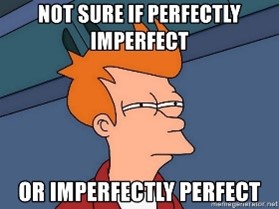Are you looking for a way to tell someone that they might not be perfect, but they are the right person for you? If so, you could use “imperfectly perfect” to describe how you love them regardless of their imperfections.” This post unpacks the meaning and origin of this expression.
Meaning
The expression “perfectly imperfect” means that perfection is unattainable. If perfection is unattainable, then everyone has flaws in their being. These flaws are physical and psychological, and they are different in everyone.
In a way, you could say that what makes us unique is our flaws or differences. They define our character and how we experience life. If we were all the same and perfect people, there would be no difference between us. That would be a stale existence, don’t you think?
So, when you say someone is “imperfectly imperfect,” it means that they aren’t perfect, but you accept them for their flaws and who they are. The phrase suits use when describing someone close to you, like your partner.
However, it can also refer to situations, contracts, inanimate objects, and many other things that are not perfect in life but bring you joy.
Example Usage
“Baby, you know that I love you for who you are. I accept every part of you. You’re imperfectly perfect and the right partner for me.”
“You could say that you’re imperfectly perfect. I accept you have flaws, and so does everyone else. No one is perfect, but you’re perfect for me.”
“Your personality is imperfectly perfect, and I love you for who you are. I know we all change, and I accept that.”
“This situation is imperfectly perfect. I know we expected more, but somehow, this feels right to me.”
“Everything is imperfectly perfect. Here’s nothing we can do to change any of it. We just have to accept it for what it is.”
“It is what it is, and we’re imperfectly perfect by design. No one is flawless, and we all make mistakes from time to time.”
“We are all perfectly imperfect. In some ways, we are unique and awesome, and in others, we are weak and flawed.”
“Discovering someone’s weaknesses and strengths is an important part of learning their character. We are all imperfectly perfect, and we can do nothing to prevent that.”


Origin
The expression “perfectly imperfect” has an unknown origin. However, language experts believe the saying has been around for at least the last 50-years since the 1970s. There are some suggestions of the expression arising from pop culture and music. Still, there is no official record of the phrase's origin in this regard.
The song “All of Me,” featured on the album “Love in the Future,” written by John Legend and released in 2013, uses a similar version of the expression.
“Cause all of me
Loves all of you
Love your curves and all your edges
All your perfect imperfections.”
Phrases Similar to Perfectly Imperfect
- I adore you.
- Beauty is the shadow of imperfection.
- She was completely whole and yet never fully complete.
- The more I feel imperfect, the more I feel alive.
Phrases Opposite to Perfectly Imperfect
- Flawless.
- Perfect.
What is the Correct Saying?
- Imperfectly perfect.
Ways People May Say Perfectly Imperfect Incorrectly
The phrase doesn’t refer to inanimate objects. Saying that your car is imperfectly perfect would be incorrect. Cars come from the manufacturer built to a certain spec. That means they are all clones of a perfect model and are essentially flawless.
Acceptable Ways to Phrase Perfectly Imperfect
You can use the phrase “imperfectly perfect” when describing your partner in your relationship. It means that you accept them for who they are, despite their flaws. It means that you think they are perfect for you, and you adore them for their role in your life.
The phrase suits social use, and you’ll probably only hear it said between people in a relationship. It’s a way of expressing your love and appreciation for someone, letting them know that they are your soulmate and the one for you.